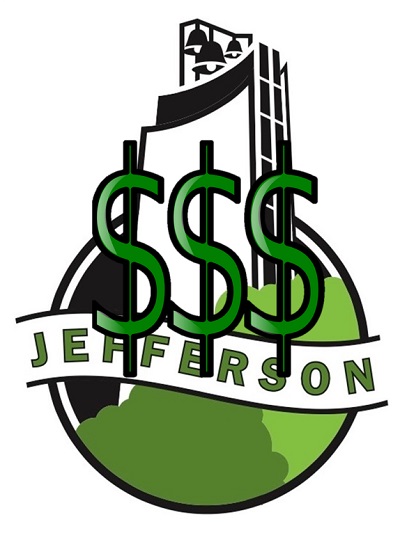
The council held a public hearing on the proposed property tax levy for FY 2021-22 (ending June 30, 2022). The hearing was held to comply with a new state requirement that municipalities disclose the amount of a change in revenues derived from certain levies. If the increase is more than 2 percent, the city council must approve the increase by a two-thirds majority, not a simple majority.
In Jefferson, the increase in revenues in the proposed budget from those levies is less than 0.5 percent, with the total maximum revenue from those levies at $1,821,612. The budget shows revenues over expenses by $12,667, or 0.4 percent of the budget.
No one spoke at the public hearing and the council approved a resolution approving tax levies for FY 2021-22.
The budget was presented and discussed during a “workshop” as the last agenda item for the meeting.
The proposed budget pegs the total property tax levy at $14.91 (per thousand dollars of taxable valuation). Of that, $12.56 is for the general fund and $2.365 is for debt service. The total levy will decrease from $15.10 in the current year.
Historically, the total levy has decreased every year since FY2013-14. The total levy that year was 15.307. The highest total levy in the past 15 years was 16.432 in FY 2006-07. The general fund levy that year was lower, at 12.434, but the debt service levy was 3.998.
The decrease in levy rates comes despite a decrease in total property valuations and the amounts available for use. For the new fiscal year, the total valuation in the city is $274,618,100, a decrease from $278,774,398. Applying the state mandated rollbacks (percentages of total valuation on which property tax is paid), the total valuation for general fund use is $147,690,938, decreased about $1.1 million from $148,811,130 in the current year. The total valuation for debt service use in the new year is $176,334,388, decreased about $1.6 million from $177,904,241 in the current year.
General fund property tax revenues in the 2021-22 budget total $1,376,000. Total general fund revenues from all sources is $3,162,958. That compares to $3,053,340 in the current year.
Expenditures in the 2021-22 budget total $3,150,291, with revenues over expenses a slim $12,667, or 0.4 percent of the total budget.
- Revenue and expenses by departments are:
- Police – $49,000 revenue; $881,850 expense
- Fire department – $53,597 revenue; $152,864 expense
- Animal control – $6,500 revenue; $18,000 expense
- Street – $0 revenue; $99,562 expense (FICA, IPERS, group insurance, clothing allowance)
- Pest control – $0 revenue; $5,000 expense
- Library – $29,410 revenue; $328,780 expense
- Recreation – $312,500 revenue; $398,812 expense
- Parks – $400 revenue; $133,103 expense
- Swimming pool – $33,900 revenue; $77,250 expense
- Swim team – $8,251 revenue; $8,251 expense
- Golf course – $130,400 revenue; $205,083 expense
- Cemetery – $20,600 revenue; $126,170 expense
- Economic development – $90,000 revenue; $166,000 expense
- Building department – $12,300 revenue; $118,916 expense
- Administration – $430,000 expense, with $430,200 in transfers from various departments
- Road use – $548,000 revenue; $581,985 expenses
The budget includes $450,000 in revenue from the local option sales tax (LOST) and $539,000 in expenses. The larger line items are $155,000 for street improvements; $165,000 for alley replacement; and $70,000 for sewer system maintenance.
In the enterprise funds, revenue and expenses are projected as follows:
- Water – $1,263,400 revenue; $1,340,396 expense
- Wastewater – $999,088 revenue; $684,116 expense
- Sanitation – $540,400 revenue; $630,804 expense
- Recycling – $212,000 revenue; $161,357 expense
- Airport – $113,500 revenue; $112,100 expense
The council also held a public hearing required before entering an interim loan agreement with the Iowa Finance Authority for a $700,000 loan to cover administrative, legal and engineering services for the wastewater plant upgrade. The loan will be at no interest for up to three years. At that time, the loan will be rolled into the financing package for the entire project.
In other business, the council approved a resolution accepting a gift of up to $50,000 from Barbara Hanen to be used only for acquiring and removing dilapidated residential properties in the city.
City administrator Mike Palmer told the council Hanen wants to see the process of cleaning up dilapidated houses continue. He said the gift is in addition to what the city had budgeted, not a replacement of city funds, and called the gift “another tool” for the process.
Many small dilapidated houses have already been removed, leaving larger houses that cost more to demolish, Palmer said. “This is a real gift to the city to be able to continue on with the demolitions,” he said. “It helps us acquire properties, too.”
The funds can be used in the process of acquiring the properties, which may include paying delinquent taxes.
Building and zoning coordinator Chad Stevens said a large house can cost up to $70,000 to tear down. He said the Hanen money will cover the costs of removing five to seven houses.
The city currently provides up to $2,000 toward the cost of removing a dilapidated house.
The council approved holding a public hearing at its regular meeting Feb. 23 regarding issuing up to $400,000 in bonds to augment more than $634,000 already raised privately for construction of a new animal shelter. The city’s bond counsel, Tim Oswald of Piper/Sandler, said the public hearing is the logical “jumping off point” for the city’s participation in funding the project.
The council approved continuing the closure of the alley to the north of Doc’s Stadium and leasing it to the business for three years. The business does not pay “rent” to the city, but must carry comprehensive liability insurance on the space. Doc’s uses the space for outdoor seating.
